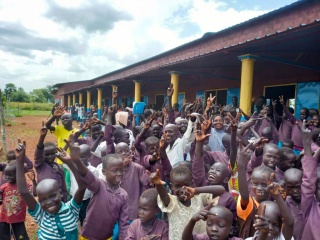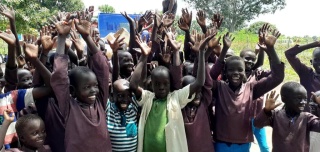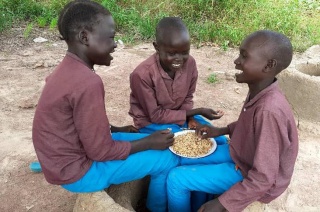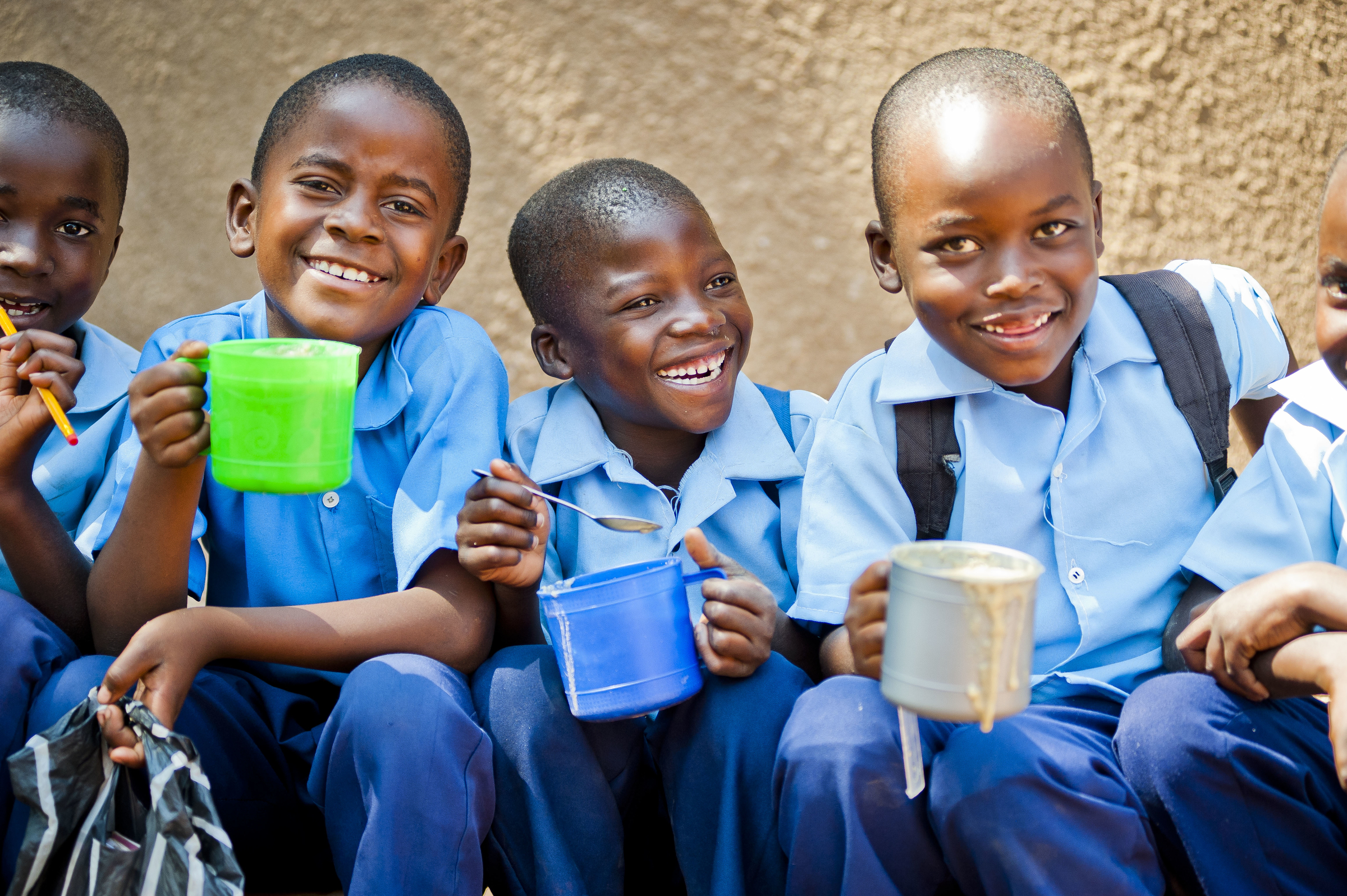
An offering of peace in South Sudan
Sister Grace, Director of Mary Help Association (MHA), talks about the realities facing children and communities across South Sudan
Three years before Mary’s Meals’ founder Magnus MacFarlane-Barrow first loaded a jeep with aid destined for Bosnia-Herzegovina, Sister Grace was compelled to make her own life-changing journey. From her home in Kerala, India, she travelled thousands of kilometres to South Sudan.
It began when she was asked a challenging question by a missionary who was working in the East African country. The missionary explained the conditions faced by the South Sudanese: the lack of education; the lack of healthcare; the effect of malnutrition and hunger and more. They asked, ‘Is there anybody who is ready to give up everything, even their own life, to save hundreds of these poor children?” This was a profoundly confronting question for Sister Grace. “I do not think anyone has the courage to give the answer, ‘yes.’ But I know that I give my life completely for Christ and to serve the poorest of the poor. I took the decision to give up everything and follow him.” She has been working to improve living conditions for the South Sudanese ever since.

Sister Grace, known as ‘Sister Gracy’ to friends, is the director of one of Mary’s Meals partner organisations – Mary Help Association (MHA). MHA is one of two partners that Mary’s Meals works with to provide daily school meals to children across the country. Between MHA and our other partner in the region – the Diocese of Rumbek – Mary’s Meals reaches more than 75,000 children in South Sudan. [While both of our partners is South Sudan are Catholic organisations, they reach out to communities of all faiths and none in line with our model and values.] These two organisations help to deliver the school feeding programme, using their expert local knowledge to make the biggest possible impact. Much like Magnus’ long drives to Bosnia-Herzegovina being the starting point for Mary’s Meals, Sister Gracy’s journey to South Sudan would not only change her life, but the lives of countless others in the years that followed.
Overcoming calamities
“South Sudan has been in a state of almost continuous war since 1965. We had the Comprehensive Peace Agreement in 2005, and we have had peace at some points. In 2011, South Sudan achieved independence, but unfortunately conflict started again in 2012. That same fight spread to almost all parts of the country. By 2014, it was a full-blown war.
“In 2018, another peace agreement [R-ARCRSS] was signed, but even though there is this fragile peace agreement, in many parts of the country there is still conflict. At any part of the country at any time, spontaneously, the conflict can erupt. People are killed, people are injured, and people are running away. This has been constantly happening in South Sudan. And on top of that, sometimes the rain will not come on time which causes drought. Then, suddenly, rain comes, but it is too much rain, and it causes floods. When rain came too heavily, it destroys the crops and sustenance farmers don't get a good harvest. On one side there are man-made calamities, and on the other side nature can make the calamity, but in both, people are victims.
“People anywhere can be living together as one family, and from nowhere conflict erupts between them, and we don't know why. In the latest outbreak of conflict we had, there was no previous fighting in the region at all. And then, suddenly, they started fighting. There were so many years of living in peace, with families living and working together.
“The majority of people are illiterate and since they have not been educated, it is even harder to hold their leaders to account. Young people are told that each of them are going to get to something very big, but they are hoping for something that does not exist. But when everything is over, they realise, ‘we lost’, because they lost themselves.”

The power of partnership
Mary’s Meals formed a partnership with MHA in 2021. Through this partnership, we were able to expand our existing programme in South Sudan to bring daily meals to 5,000 more children and positive change to communities who are facing big challenges. Since then, we have expanded even further to provide more much-needed meals through MHA.
In South Sudan, persistent conflict, economic crises, reduced crop production, and a reliance on imports undermines households’ ability to secure food and puts millions of lives at risk. MHA works in a region that has been contested between the government and rebel forces over the last few decades and it’s an area that’s reeling from the consequences of this conflict.
MHA re-established and – in some cases rebuilt – schools that had been abandoned after years of fighting in the region. After ensuring that local children had the opportunity to return to school again, MHA has guided and supported the local community to build food stores and train volunteers so they can play their part in running the school feeding programme. This support, dedication and partnership working has brought Mary’s Meals to thousands more children across the region. On Mary’s Meals, Sister Gracy says:
“The very words ‘Mary’s Meals’ bring to mind something good. For me, it simply means giving a meal to hungry children. We count so much on Mary’s Meals. The children from South Sudan are depending on it, and they are so grateful to Mary’s Meals. Before the school feeding programme, the children would still [try to] come to school, even if it meant going hungry. And now when they get this meal, they feel so happy. If that meal is not there, most of the children will go hungry, and they will not be able to come to the school because they must look for something to eat. But since Mary’s Meals is there, they can come to the school, and they can learn.”

Old and new challenges
The situation faced by many in South Sudan today is a difficult one. South Sudan is one of the poorest countries in the world, ranking 185 out of 189 countries in the Human Development Index. At the beginning of December 2022, there were reports of a serious outbreak of violence in South Sudan’s Upper Nile state. In April 2023, clashes in South Sudan’s neighbouring country Sudan sent thousands fleeing for safety. This history of conflict has had drastic consequences on the population living here. On this, Sister Gracy says:
“The community where I am working is in a rebel-held area, which means that the government soldiers came and fought with the people living there. The people were chased out of these lands and went deep into the forest for their safety. As the conflict went on, the schools closed. We knew that we didn't want that the children learning to fight, so we immediately opened schools, under trees and in makeshift tents. Our message to the children was, ‘Don’t go to fight, remain in school’, and to school they came!
“Even though in the beginning we had very little, they were learning. And then Mary’s Meals came. One of our sisters had worked with Mary’s Meals in India. Once she saw the suffering children of South Sudan for the first time, she cried and said, ‘You know, the children of India are fed with Mary’s Meals. Let us ask them for help, so that these children can have one meal’. And she asked Father Joson in India, and he then asked Alex (Mary’s Meals’ Director of Progammes) who was in Scotland, and Alex interviewed us in South Sudan, in Rumbek, where we are based. Moses from the other partner in South Sudan, the Diocese of Rumbek, then came to see us. And then, Mary’s Meals started!
“In 2016 and 2017 all the schools were closed. Since then, we have restarted the schools and opened new ones. I will make sure that as many run as possible. A great desire of mine is to develop some infrastructure; permanent schools, built through community cooperation. The community will do what it can, and we will help with whatever we can offer.
“The communities supervise the school feeding programme because it is theirs, it is the community’s teachers and volunteers that run it, and it is for their children. It's their programme, not just my programme, or even Mary’s Meals’ programme. We are here only to help them help their children.
“What we do know is that all the schoolchildren are asking for food. We now feed over 11,000 children, and we are hopeful that Mary’s Meals will continue to help feed the children of South Sudan. Once we start the Mary’s Meals school feeding programme, the children never miss school!
“Before the feeding programme, many children used to be malnourished. And when they are malnourished, their immunity level goes down and they can succumb to more types of illness. In South Sudan, Malaria is very common. Most of the children live in districts where there is no health worker who they can see. If it is serious, they have to walk long distances to find help, even up to 100 kilometres. The feeding programme means that not only are they healthier, but this risky journey happens less.”

Learning to live in peace
“The direct impact of Mary’s Meals is that we are feeding and educating children. When we educate children, they will be able to think in a better way, and they can less easily be manipulated. That is because they can read, they can write, they can see what is happening in other parts of the world, and they can start reasoning. Things will be different for them.
“These same children will be able to spread peace, because education teaches them how to live in peace, to not go fighting or spreading conflict. South Sudan is not for one side or the other, they must live with peace. South Sudan has a lot of wealth, and it has to be shared. If they can share, they will benefit from the wealth. We are trying to educate them and with education I am sure that through these little ones when they grow up, peace will come to South Sudan.
“When you see South Sudanese children, they're happy. I see children playing, singing, dancing. Outside the little things, they aren’t aware what is happening. We can make them very happy. It is my belief that they have a right for education, a right for proper meals, and a right for play. But the little ones here, they may have to carry other children, their siblings, just to get to school. Or, they must feed other children from their share.
“If it wasn’t for the meals, they cannot come to the school. They have to take care of the house, they have to do the chores, and they don't have time to play. The majority of the children do not have a proper bench to sit on, a proper desk to write on, or even a blackboard to learn from. But I want to say that all the children still have a good school, they're happy, and they get their childhood rights. This is one of my greatest desires. We have managed to build a hospital, so when children become sick, they have a place to sleep. And now I really want to see good schools so that they can get good education too.”

A message to the Mary’s Meals family
“I am very grateful to Mary’s Meals for the support that you are giving us. And I'm also grateful to all the donors who are giving all of their might to Mary’s Meals. South Sudanese people are very good people. They are very friendly, very accommodating, and very welcoming. South Sudanese people are very loving people. And when you work with them, you find that you really love them too. Maybe these meals can continue to reach out to millions of children all over the world, not only in South Sudan, but even in other countries. Thank you so much.”

